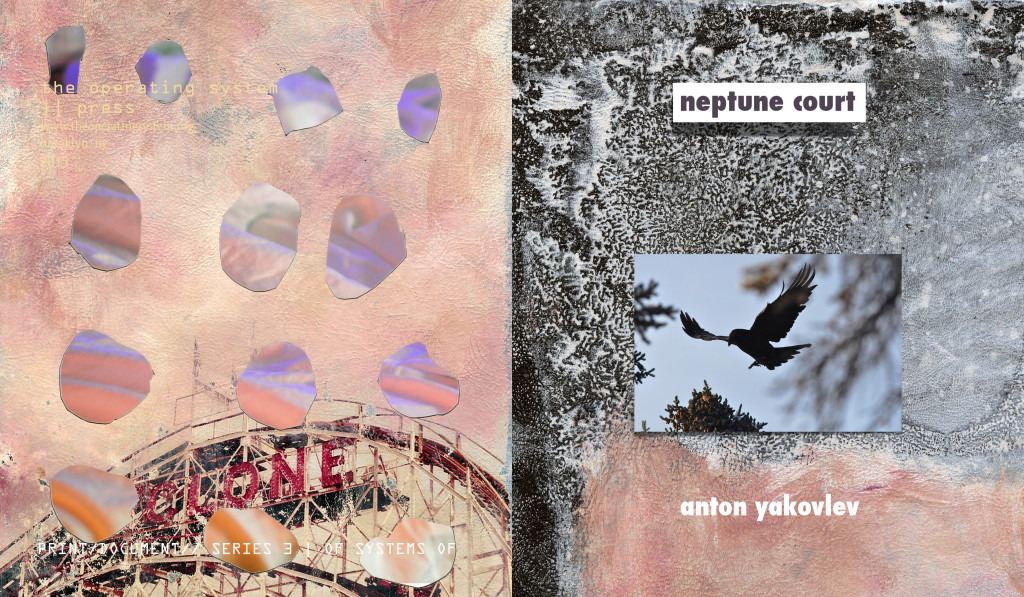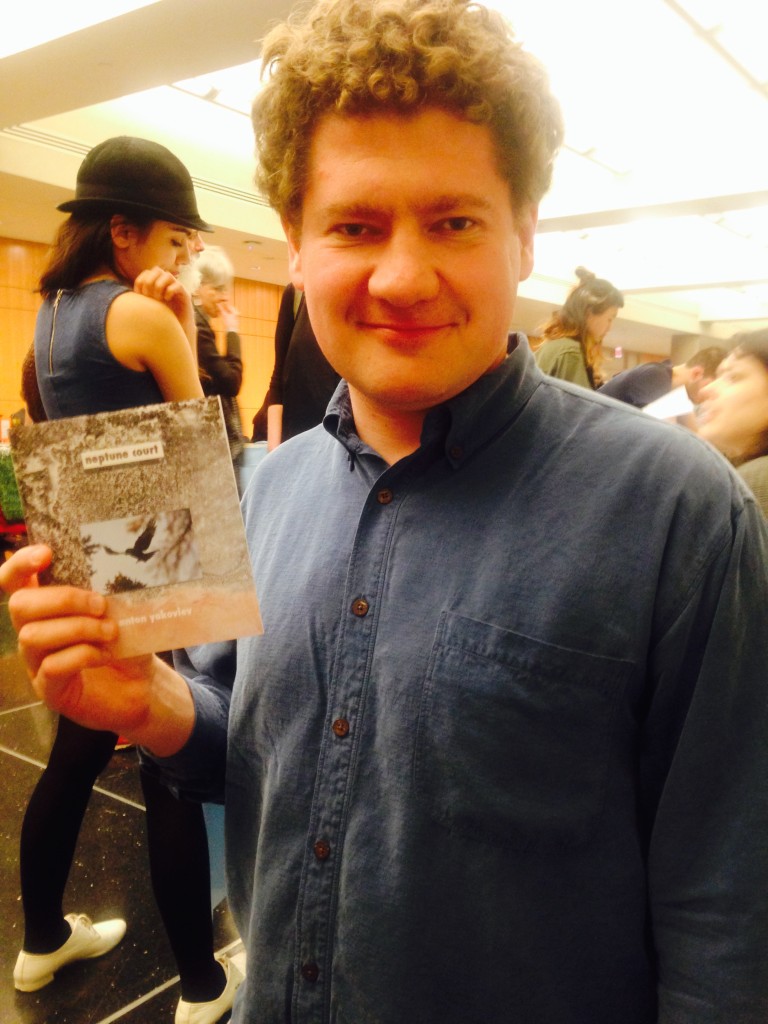[re:con]versations :: Digging Deeper with NEPTUNE COURT's Anton Yakovlev
![]()
![]()
 [line]
[line]
[box]
[quote]In April 2015, The Operating System’s 3rd Annual 4-Chapbook Series, OF SYSTEMS OF, appeared on the scene. A strikingly beautiful set, featuring original art created for the series by Emma Steinkraus, these slim volumes in fact contain multitudes — and their diverse, stylistically varied voices represent four new, decidedly distinct entries into the seemingly ever expanding landscape of young poets publishing today.
In celebration and anticipation of our launch reading this week at VON I wanted to dig deeper with these poets, giving them an opportunity to engage in process dialogue about these texts and their creative practice, and giving you the opportunity to break right through that fourth wall.
I stole a line (which is to say, I recycled some of my own questions) from an interview I did with poet JP Howard, which appears in SAY/MIRROR — and extrapolated from there in speaking to each of these poets, teasing out answers as different as the poets themselves.
Please consider this template, approaching The OS’s key concerns of personal and professional practice/process analysis combined with questions of social and cultural responsibility, as an Open Source document — questions to ask yourselves or others about process and the role of poetry today.
In this conversation, I talk to Anton Yakovlev about his work and his debut chapbook on The OS Press, Neptune Court.
Series Editor / OS Managing Editor Lynne DeSilva-Johnson [/quote]
[/box]
[line][line]
[articlequote] “…my work shows everyday life while injecting it with elements of the surreal or the metaphorical in an attempt to get to a better understanding of what’s really happening, … [speaking] to this dichotomy between the commonplace and the metaphorical.” Anton Yakovlev [/articlequote]
[line][line]
Who are you?
Textbook editor by day, occasional filmmaker; sometimes I write texts that have line breaks in them.
Why are you a poet?
My father read poems to me instead of lullabies since I was a couple of weeks old, and I guess poetry seeped into my subconscious pretty quickly that way. Eventually I started to try writing it myself.
When did you decide you were a poet (and/or: do you feel comfortable calling yourself a poet, what other titles or affiliations do you prefer/feel are more accurate)?
I never consciously decided it. If a poet is “someone who writes poetry” (the dictionary definition), then I guess I am one. If “poet” is more of a supernatural calling, then I don’t think I should presume to call myself that. I never introduce myself to people as a poet. Maybe it’s best to say writer, though I’m not doing it full-time.
What’s a “poet”, anyway?
(Please see above.)
What is the role of the poet today?
I think a poet’s writing reflects the cultural values and zeitgeist of the times. I definitely don’t think poets are (or should be) viewed as some kind of an oracle or prophet (though a relatively small number might have been seen that way centuries ago). It’s more about bearing witness to what’s happening in the world as opposed to preaching from some sort of a lofty mountaintop. Poetry definitely has a place in social movements and activism, though I think the social movement must come first, with poetry (like any art) joining in along the way to illustrate and make sense of what’s happening and make it clearer what people are fighting for.
What do you see as your cultural and social role (in the poetry community and beyond)?
I don’t think I’ve reached nearly enough of a wide audience to have a cultural or social role that’s worth speaking about, though if that were to happen at some point, I would like to be someone who can bring people together by engaging with real-life experiences in ways that transcend the personal and become universal.
[line]
Talk about the process or instinct to move these poems (or your work in general) as independent entities into a body of work. How and why did this happen? Have you had this intention for a while? What encouraged and/or confounded this (or a book, in general) coming together? Was it a struggle?
I knew that many of my poems were firmly rooted in specific locations, and in putting together this collection I decided to gather pieces that were linked to places one could identify, with the poems hopefully looking at those locations from some interesting angles.
Did you envision this collection as a collection or understand your process as writing specifically around a theme while the poems themselves were being written? How or how not?
I did not write these poems with the idea of a collection, but it felt fairly natural to put them together. A lot of my work shows everyday life while injecting it with elements of the surreal or the metaphorical in an attempt to get to a better understanding of what’s really happening. I tried to gather a number of poems that spoke most clearly to this dichotomy between the commonplace and the metaphorical.
The four chapbook collection lives under the umbrella OF SYSTEMS OF, and yet the books are wildly different in content and style. How does the idea of systems, either metaphorically or literally, play a role in your work? Why do you think I chose this moniker?
I think each collection presents a world view, a way to make sense of the world (to some extent), which requires a certain system of perceptions and ways of processing what one perceives. The collections are very different because each person has a very different way of perceiving the world and reacting to it.
Speaking of monikers, what does your title represent? How was it generated? Talk about the way you titled the book, and how your process of naming (poems, sections, etc) influences you and/or colors your work specifically.
I have quite a few poems titled after geographic locations, street names in particular. This includes poems that describe somewhat outlandish or improbable events. Neptune Court, a street name in Boston, seemed very appropriate as the title for the collection because it’s grounded in real geography while also having obvious mythological and symbolic implications. The title poem combines a made-up story (intentionally somewhat ridiculous) as a way to talk about a personal drama. Many poems in this collection are written in this mode.
[line]
What does this particular collection of poems represent to you
…as indicative of your method/creative practice?
…as indicative of your history?
Many poems are semi-autobiographical or based on experiences of individuals I know. They are attempts to process personal experience and figure out its real meaning by placing the lived events in the realm of allegory.
…as indicative of your mission/intentions/hopes/plans?
I want to reach as many people as I can with narratives that can hopefully move them and feel relevant, rather than feel remote or “exclusive” in any way.
What formal structures or other constrictive practices (if any) do you use in the creation of your work? Have certain teachers or instructive environments, or readings/writings of other creative people (poets or others) informed the way you work/write?
While all the poems in this collection are written in free verse, I do also use traditional form a fair amount, somewhat in keeping with the Russian tradition where regular meter and rhyme are still very much commonplace today. Since college, where poetry was one of my majors, I’ve been a member of several workshops and writing groups, including the Powow River Poets in Massachusetts and the Rutherford Red Wheelbarrow in New Jersey, as well as the Carmine Street Metrics reading series in New York City. All of them have profoundly influenced and shaped my writing attempts while providing invaluable communities where individuals with some very different aesthetics and writing styles could critique poems and exchange ideas.
[line]
Let’s talk a little bit about the role of poetics and creative community in social activism, in particular in what I call “Civil Rights 2.0,” which has remained immediately present all around us in the time leading up to this series’ publication. I’d be curious to hear some thoughts on the challenges we face in speaking and publishing across lines of race, age, privilege, social/cultural background, and sexuality within the community, vs. the dangers of remaining and producing in isolated “silos.”
I aim to communicate with as many social and literary circles as possible; I believe in being as eclectic as I can in terms of community involvement so as to avoid getting entrenched in any particular group or mode of writing. I have written a number of poems that relate to social activism, especially dealing with climate change. I think I still need to find a way to write about the current civil rights movement without sounding overly prescriptive or preachy. There are many contemporary authors I admire and am trying to learn from in this respect, including the outstanding poet Ewuare Osayande and The Operating Systems’ own J.P. Howard.
[line][line]
Praise for Neptune Court:
[articlequote]If one of the delights of poetry is the way it provides the reader access to a mind as different from his own as the landscape of another planet, then Neptune Court is an invitation not to be missed. The situations Anton Yakovlev responds to in these poems are the universal ones that face us all on the border between solitude and the risks of engagement: love overvalued and undervalued, lost, mourned, reimagined, counted on too heavily, longed for, mythologized, consciously transformed into the stuff of art, examined in the mirror of another’s experience. What is different—indeed, unique—is the phantasmagorical imagery deployed to tell the stories—surreal, peopled with unexpected characters and humanized abstractions—against bizarre backgrounds where biographical events unfold like tiny dramas, almost accidentally but with surprising emotional force. – Rhina P. Espaillat[/articlequote]
[articlequote]If art is the lie you tell to tell the truth, the poems in Neptune Court are precision-made howlers that bring you nose to nose with yourself. – Jim Klein[/articlequote]
[articlequote]Anton Yakovlev’s world is strange and beautiful, vaguely resembling Bergen County. Inside it, a zebra rides a motor boat on East River; there are ghosts and ghost writers, lovers drifting apart, the doomed and the graceless, and the always-grinning Almighty. You, the reader, will be mesmerized. You’ll have to surrender all caution and enter his poems with “your sneakers soaked, / your camera steady, / your heart awake.” – Claudia Serea[/articlequote]
[line]
[box]
 Originally from Moscow, Russia, Anton Yakovlev lives in Ridgewood, New Jersey and works as a college textbook editor. He studied filmmaking and poetry at Harvard University. His work has been published or is forthcoming in The New Yorker, The Raintown Anthology of Contemporary Poetry, Angle, Cardinal Points Literary Journal, The New Verse News, The Rutherford Red Wheelbarrow and elsewhere. He has also directed several short films. He recently contributed a piece on Joshua Mehigan for our NAPOMO series, and performed live with us for GROUP HUG! at Mental Marginalia.
Originally from Moscow, Russia, Anton Yakovlev lives in Ridgewood, New Jersey and works as a college textbook editor. He studied filmmaking and poetry at Harvard University. His work has been published or is forthcoming in The New Yorker, The Raintown Anthology of Contemporary Poetry, Angle, Cardinal Points Literary Journal, The New Verse News, The Rutherford Red Wheelbarrow and elsewhere. He has also directed several short films. He recently contributed a piece on Joshua Mehigan for our NAPOMO series, and performed live with us for GROUP HUG! at Mental Marginalia.
[/box]
[line]
[recent_post_thumbs border=”yes”]


